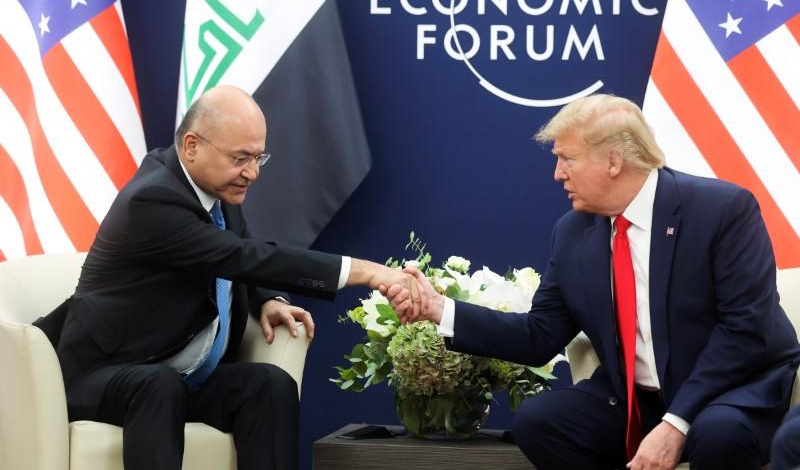Saturday 25 January 2020 - 16:22
Story Code : 368856
DAVOS-Absent Iran faces detente calls from worried West and Middle East
Zarif, normally a regular at the World Economic Forum, cancelled on Monday, with his ministry citing programme changes. Organisers of the annual gathering in the Swiss ski resort did not comment on the reason given.
While Iran was absent from the corridors of the conference centre, there was an urge for de-escalation among those present.
Iraqi President Barham Salih said he had a productive conversation on Iran with U.S. President Donald Trump, who made few public comments on the issue while in Davos, after signalling this month he was ready to de-escalate the situation.
�We had a very candid conversation (about) the need for basically restraint, calming things down... This is not time for another conflict,� Salih said on Wednesday.
Washington blamed Qaseem Soleimani, Iran�s top general, for masterminding attacks by Iran-aligned militias against U.S. forces in the region. His killing in a U.S. drone attack left regional analysts concerned it could spark a war.
Iran responded to Soleimani�s killing by launching missiles at U.S. targets in Iraq, although it flagged that the attack was coming and no U.S. soldiers were killed.
In Davos, Saudi Arabia�s Foreign Minister Prince Faisal bin Farhan Al Saud told Reuters the kingdom was open to talks with Tehran and that �many countries� had offered to mediate.
Riyadh has accused its arch-rival of attacking its oil facilities in September 2019, an attack that briefly knocked out half of Saudi�s oil production. Tehran denies any involvement.
Saudi finance minister Mohammed al-Jadaan said Riyadh, which holds the G20 presidency role, was calling for dialogue.
�If you look at history, we in this region have managed to weather through worse geopolitical situations, including actual, real wars,� he told Reuters.
�We in Saudi have to focus on the economy and reform ... We firmly believe the disputes can only be resolved by dialogue.�
OPEN FOR DIALOGUE
Zarif tweeted on Thursday that Iran remained open for dialogue: �We announce our readiness to participate in any complementary work that is in the interest of the region.�
But with his characteristic sharp tone, he also took swipes at Saudi Arabia over its five-year military intervention in Yemen and the murder of journalist Jamal Khashoggi inside its diplomatic mission in Istanbul.
��Normal� countries don�t operate abattoirs disguised as consulates. �Normal� countries don�t attack their neighbors, cause a humanitarian crisis, and refuse to talk,� Zarif tweeted. �Nonetheless, WE don�t set preconditions for dialog.�
Iran has said it will not abide by the nuclear deal it signed with six global powers. Washington pulled out of it in 2018 and wants Europe to work on a new, tougher agreement.
German Chancellor Angela Merkel warned in Davos against prematurely scrapping the deal, saying that it would be wrong to abandon something �imperfect� with nothing better in place.
Despite de-escalation efforts, nerves remain on edge.
As Davos began on Tuesday, Iran�s semi-official news agency reported that lawmaker Ahmad Hamzeh had announced a $3 million award to �whoever kills Trump�.
And the U.S. special representative for Iran, Brian Hook, said Soleimani�s successor would suffer the same fate if he followed a similar path by targeting Americans.
Pakistan�s Prime Minister Imran Khan said he had told Trump that a war with Iran would be �a disaster for the world�. It is not clear how the U.S. president responded.
As well as wishing for tensions to calm, one Saudi official made clear the weigh of that obligation rest with Iran.
�The escalation is really coming from the Iranian side,� Adel al-Jubeir, Saudi�s minister of state for foreign affairs, told a Davos panel on �The Unsettled Middle East�.
�We can�t deescalate because there�s nothing to deescalate from on our side... It�s up to the Iranians to decide if they want to provoke a reaction from the international community or not.� (Writing by Dmitry Zhdannikov Editing by Alexander Smith)
# Tags











